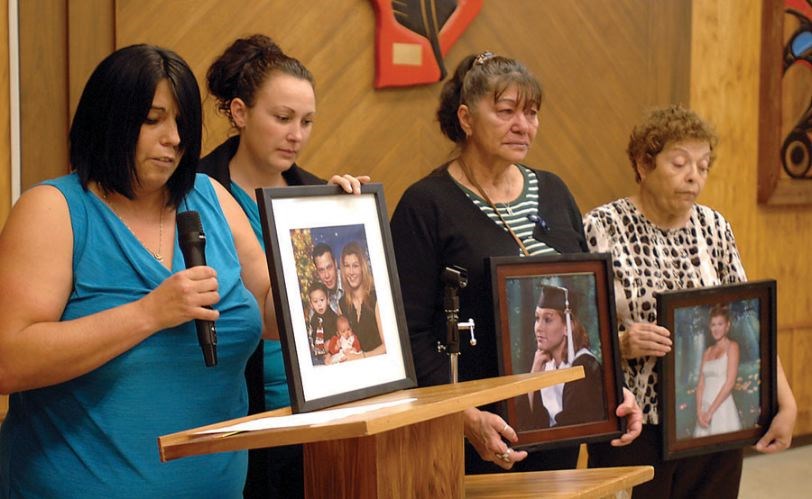As part of cross-Canada events in the past two weeks, Prince George added its voice to calls for an inquiry into the missing and murdered women of the nation.
Many of those lost are from northern British Columbia, and a gathering was held Monday at the Prince George Native Friendship Centre to commemorate the names associated with the Highway of Tears, the northern women who fell victim to the downtown of Vancouver, and many others spread across time and geography.
Members of the victims' families gathered in a private ceremony with advocates, followed by a public event - the symbolic release of white balloons - to draw attention to unresolved questions. The fact so many are Aboriginal, the fact so many of the violence victims (including survivors) are women, and the fact justice results feel inadequate were all open wounds for those in attendance.
"It has come to a point where our [Aboriginal] relationship with the [federal and provincial governments] has come into question," said Terry Teegee, chief of the Carrier Sekani Tribal Council.
"In many ways, the way you judge a society is how it treats its most vulnerable citizens."
Master of ceremonies Allen Cummings praised the many families who were there to represent their victimized loved ones. Despite being put in a position of reliving a trauma, he said, they bravely stepped forward to call for a national inquiry.
"Natasha was a caring, fun-loving mother, a talented young woman," said Louanne Montgomery, mother of victim Natasha Montgomery.
"We know she would want us to be the voice for all the missing women and their families. She wouldn't want anyone to endure what we had to go through... and fight for social change, to protect women from the overt violence and injustice today."
"We have to stand up against violence and the violators, right now," said Doug Leslie, father of victim Loren Leslie.
The family of victim Cynthia Maas issued a statement saying she had been the target of violence since a toddler, so the issue went deeper than disappearances and allegations of murder that dominate the headlines.
"Aboriginal women have long experienced devaluation that stems from lack of place in our society which increases our vulnerabilities and can result in tragic consequences as we have experienced," the Maas family said.
"We as a society need to demonstrate courage and take action to change those policies and procedures that enabled our loss. A national review of our western-based social service systems must occur."
The group of families and their supporters spent time, Monday, with Charlene Belleau, a representative of the Assembly of First Nations and also a member of the Alkali Lake First Nation which became famous for dramatically healing their internal wounds (nearly 100 per cent alcoholism rate) and executing a social turnaround.
"Last Friday there were more than 200 rallies across the country in honour of missing and murdered women," she said.
"The national chief [Shawn Atleo] delivered a passionate plea for a national inquiry. These families have suffered the absolute worst of a society's breakdown. As a country, Canada faces a grave human rights crisis."
Police were called on to go above and beyond the call of duty to investigate allegations of violence wherein the victim is female, courts to do the same in prosecuting the offenders, but these were on a case by case basis, said those at the gathering. Due to the systemic nature of these deeply impactful crimes, a national inquiry is needed to root out the foundational causes and light the way to solutions.



